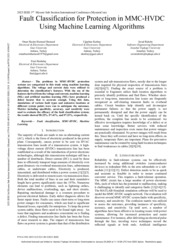Fault Classification for Protection in MMC-HVDC Using Machine Learning Algorithms
-
Yazar
Cevat Rahebi
-
Tür
Konferans Kağıdı
- Yayın Yılı 2023
- Veritabanları Scopus
- DOI 10.1109/MysuruCon59703.2023.10396927
-
Yayıncı
IEEE Xplore
- Dergi IEEE Xplore
-
Konu Başlıkları
Fault classification
MMC-HVDC
Machine Learning
The problems in MMC-HVDC protection systems are categorized in this study using machine learning algorithms. The voltage and current data were utilized to determine the classification's features. With the use of the features derived from the voltage and current, machine learning (ML) and artificial machine learning (ML) have produced a defect locator that is accurate enough. Using this data, simulations of various fault types and unknown locations at different system points were run to anticipate the outcomes. Metrics including specificity, accuracy, and sensitivity were used to evaluate the efficacy of the fault classification system; the results showed 98.22%, 97.41%, and 97.23%, respectively.
-
Koleksiyonlar
Fakülteler
Mühendislik Fakültesi

Görüntülenme
16
25.01.2024 tarihinden bu yana
İndirme
1
25.01.2024 tarihinden bu yana
Son Erişim Tarihi
06 Eylül 2024 03:54
Google Kontrol



